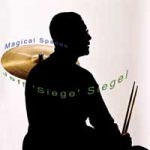
Track listing:
1. Graz Is Greener On The Other Side
2. Blue Heart
3. A Flower For Diane
4. Opening Statement
5. Threads
6. M Song
7. Peaceful
8. Magical Spaces
9. Mourning For Kevin O'Connor
10. Twilight
11. Africa
12. Lenny
13. Sir Roland
14. Postcard to Arthur Rhames
15. Peaceful (instrumental bonus track)
Personnel:
Jeff Siegel - drums
Francesca Tanksley - piano
Danton Boller - bass
Erica Lindsay - tenor sax
click here for audio samples or to purchase this CD
click here to learn more about Jeff Siegel
|
|
JEFF “SIEGE” SIEGEL - Magical Spaces
(CAP)
by J Hunter
Just like with my government, I want less corporate involvement with my jazz. Sure, major labels like Blue Note and Verve helped establish the genre, but it's indie outfits like Palmetto, Rope-a-Dope and MaxJazz that are doing the truly interesting releases, while the aforementioned majors are too busy playing the world's dumbest reality show, “Searching For (The NEW) Norah Jones”.
A good example of indie-jazz quality is Magical Spaces (CAP), a wonderful collaboration of like-minded musicians led by drummer/percussionist Jeff “Siege” Siegal, who's worked with artists ranging from Ron Carter & Sir Roland Hanna to Ravi Coltrane & Wadada Lee Smith. Siegel has brought together three veteran performers - tenor player Erica Lindsey, pianist Francesca Tanksley, and bassist Danton Boller - to record a straight-ahead disc that sounds familiar while keeping you wondering what comes next. Put this on a major label's doorstep and they'd want to pretty it up (i.e. make it more “marketable”). Fortunately, Siegel walked past that doorstep.
The first track, “Graz is Greener on the Other Side”, is the tone-setter for the disc: This is take-it-or-leave-it-and-take-no-prisoners Trad jazz, without an ounce of commercial pretension. Lindsey's first solo serves up a plateful of chops, except they are served with substance and style. Although the tone of “Graz” changes as Tanksley and Boller take their turns in the solo spot, the intensity (and the quality) never wavers. This is the case throughout Spaces, whether on a blues like “M Song” or “Blue Heart”, an exploration like the title track, or a long-form love song like “A Flower for Diane”. Tack on a trumpet track and this disc could be mistaken for a long lost recording date from Art Blakey's Jazz Messengers. The refreshing part is that Siegel & Co. are their own players, not wannabes trying to sound like somebody else.
Siegel also follows the Blakey model of letting his players define his tunes. Lindsey is a leader herself (as is Tanksley), so it's not a stretch to say her tenor could spearhead a full disc. While she lets her inner Coltrane loose on “Graz” and “Lenny”, she can also slow it down (and warm it up) when Siegel's writing calls for it. Tanksley is a fine foil for Lindsey, contributing as much with her fills (particularly on the staccato “Africa”) as she does with her solos. There's a bubbling quality to her playing, and it only gets better when it's brought to a boil. Boller is a full contributor to the proceedings, not just one-half of the rhythm section. His bass lines are never boring or rudimentary, and his playing bears deep echoes of his mentor Eugene Wright, bass player for the Time Out-era Dave Brubeck Quartet. Kudos also go to Tim Strong for his Johnny Hartman-esque vocal on “Peaceful”.
As for Siegel, his skill as a composer is a key to this disc's success. Although rooted in established jazz history, this material is not a bunch or rewrites or homages to jazz tunes past; rather, they are the product of someone who has learned his lessons well, but wants to teach a few of his own. There's no question he is a world-class drummer; in fact, his work on the ensemble pieces make the three drum-solo tracks relatively superfluous, though two tracks - “Opening Statement” and “Twilight” - are excellent precursors to “Threads” and “Africa”, the respective tracks that follow them. The third solo, “Postcard to Arthur Rhames”, is a good piece but a bad choice for the disc's closing track. It stands by itself, without resolution, giving the disc an unfinished feel. Siegel and co-producer Baikida Carroll should have left this track in the can and let the Dizzy-like “Sir Roland” give the disc a more definitive conclusion.
The title Magical Spaces comes from the legendary trumpeter Tom Harrell, who was talking about how new sounds can be found “in the magical spaces of the music.” Siegel and his compatriots found a field full of spaces and grew a garden of simple beauty and infinite color. That'll happen when you choose “real” over “reality show”.
J HUNTER is a former announcer/producer for radio stations in the Capital Region and the Bay Area, including KSJS/San Jose (where he was Assistant Music Director/Jazz programming), Q104 WQBK/Albany, and WSSV/Saratoga. He has also written music and theatre reviews for the Glens Falls Chronicle. He currently resides in Clifton Park.
|

